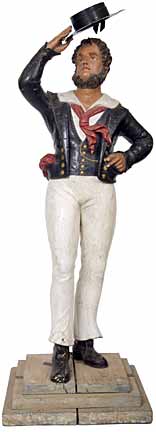Hello! Ask me (almost) anything about traditional music.
Annotation:Jacky Tar
X:1 T:Jacky Tarr M:C L:1/8 R:Hornpipe B:J. Anderson - Anderson's Budget of Strathspeys, Reels & Country Dances B: for the German Flute or Violin (Edinburgh, 1820, p. 13) Z:AK/Fiddler's Companion K:Emin B|e2 (ef) g2 (fe)|d2B2 B2(AB)|d^cde faef|d2 A2 A2 (Bd)| eBef g2 (fe)|dBGB d2 (cB)|(AG).F.E (DE).F.A|B2E2 E2|| (GA)|BGEG BGEG|BAGF E2 (FG)|AFDF dFDF|AGFE D2 (Bd)| e2 (ef) g2 (fe)|dBGA BdcB|AGFE DEFA|G2E2 E2||
JACKY TAR. AKA – "Jackie Tar." AKA and see "Alawon Fy Ngwlad," "Come Ashore," "Come Ashore Jolly Tar with Your Trousers On," "Come Ashore Jolly Tar with Your Trowsers On," "Cuckoo's Nest (4) (The)," "Cuckoo (The)," "Good Ax Elve," "Jack a' Tar," "Jack o Tar," "McGibbney's Fancy," "Mower (The)," "Reaper (The)," "Spealadóir (An)," "Trousers On (The)," "Yellow Heifer (The)." Scottish, English; Hornpipe. E Minor. Standard tuning (fiddle). AB (Manson, Wilson): AABB (most versons): AABBCC (Davie). Flett & Flett report there were at least three different Scottish country dances by this name in the early 20th century (from Angus, Perthshire and East Lothian). The tune is played as a reel for American contra dancing. See also Irish versions under the titles "McGibbney's Fancy/McGivney's Fancy", "Nead na Cuaiche" and "Eamonn McGivney's."

The title refers to the generic sailor-man. "The name 'Jack' has long been used with the implication 'typical (young) man', from nursery-rhyme characters to 'Jack Tar' for a sailor, and modern slang phrases like 'I'm all right, Jack' and 'Jack-the-lad'. The murderer who called himself 'Jack the Ripper' had a sinister sense of humour" [Simpson & Roud, Oxford Dictionary of English Folklore, 2000).


